An Unbiased View of Dementia Fall Risk
An Unbiased View of Dementia Fall Risk
Blog Article
The Buzz on Dementia Fall Risk
Table of ContentsThe Definitive Guide for Dementia Fall RiskThe Best Strategy To Use For Dementia Fall RiskIndicators on Dementia Fall Risk You Should KnowRumored Buzz on Dementia Fall RiskUnknown Facts About Dementia Fall Risk
You might be worried since you've had a loss before or due to the fact that you've discovered you're beginning to really feel unsteady on your feet. You could have noticed modifications to your health, or just feel like you're decreasing a little. Whatever the reason, it isn't uncommon to come to be mindful and shed self-confidence, and this can quit you doing the important things you used to do and make you really feel extra separated.If you have actually had a fall or you have actually started to feel unstable, tell your physician also if you really feel fine otherwise. Your medical professional can inspect your equilibrium and the method you walk to see if renovations can be made. They may be able to refer you for a drops danger analysis or to the drops avoidance solution.
This details can be obtained through meetings with the individual, their caretakers, and a testimonial of their clinical records. Begin by asking the individual about their background of drops, including the frequency and circumstances of any type of recent drops. Dementia Fall Risk. Ask about any kind of wheelchair issues they may experience, such as unstable or trouble strolling
Conduct a comprehensive review of the individual's medicines, paying particular focus to those recognized to increase the danger of falls, such as sedatives or medicines that lower high blood pressure. Figure out if they are taking numerous medicines or if there have been current adjustments in their drug routine. Assess the individual's home atmosphere for prospective risks that might raise the risk of drops, such as poor lights, loose rugs, or absence of grab bars in the washroom.
The Single Strategy To Use For Dementia Fall Risk
Overview the individual through the autumn risk assessment kind, explaining each inquiry and videotaping their actions precisely. Ensure that the specific comprehends the objective of the evaluation and really feels comfortable giving sincere answers. Compute the overall danger rating based on the reactions given in the evaluation kind. Figure out the person's danger group (reduced, medium, or high) based on the overall rating and the visibility of automatic high-risk condition variables.
On a regular basis keep track of the individual's progression and reassess their danger of falls as required. Supply continuous education and support to advertise safety and security and lower the risk of falls in their daily living activities.
Numerous researches have shown that physical treatment can help to lower the risk of dropping in adults ages 65 and older. In a new research (that looked at drops threat in ladies ages 80 and older), researchers determined the economic effect of selecting physical treatment to prevent drops, and they found that doing so conserves $2,144, consisting of all the surprise prices of your time, discomfort, missed life events, and the dollars paid for solutions.
The 5-Minute Rule for Dementia Fall Risk
Assessing your balance, stamina, and walking ability. A home safety evaluation. Based on the evaluation results, your physical specialist will certainly design a strategy that is tailored to your specific needs.
Older adults that have problem walking and talking at the same time go to a higher threat of falling. Dementia Fall Risk. To aid raise your safety throughout everyday activities, your physiotherapist may make a training program that will challenge you to maintain standing and walking while you do an additional task. Instances include strolling or standing while counting backwards, having a conversation, or bring a bag of groceries
Your physiotherapist additionally can recognize which tasks you must avoid to stay safe. Community-based falls prevention programs aid people to: Lower their fear of falling. Establish objectives for boosting their exercise. Make their homes more secure. Work out much more to increase their stamina and equilibrium. These programs often are led by volunteer coaches.
Not known Factual Statements About Dementia Fall Risk

Measles, or rubeola, is a very contagious, severe viral infectious illness brought on by the measles infection. Some people think of measles as simply a rash and fever that cleans up in a few days; nevertheless, measles can create severe health and wellness problems, particularly in children her explanation more youthful than 5-years-old. The most effective protection versus measles is the measles, mumps, and rubella (MMR) vaccination.
Falls are a common root cause of injury among older adults. According to the CDC, in one year alone, fall-related injuries added to over $50 billion in medical costs (Dementia Fall Risk). In health center settings, older adults go to particularly high danger of falls since their reduced movement from being constrained to a room or bed.
Dementia Fall Risk Fundamentals Explained

She has no background of falls, her stride is consistent, and she nullifies with no concerns. The previous registered nurse states that she calls for assistance to the bathroom when website here she needs to go.
Examples of usual loss interventions/measures consist of: Making certain a person's essential items are within reach. Past recognizing exactly how to utilize the Johns Hopkins Fall Threat Evaluation Tool, it's important that centers include its usage into a more comprehensive autumn prevention strategy.
Report this page